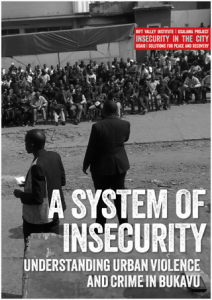A System of Insecurity: Understanding Urban Violence and Crime in Bukavu examines the role of state and non-state actors in the provision of security, and citizens’ perceptions of, experiences with and responses to insecurity in Bukavu, the capital of South Kivu province in the eastern Congo. Facing growing urban insecurity, the residents of Bukavu have taken matters into their own hands. Improvising, fending for yourself (débrouillezvous) and taking care of oneself (auto-prise en charge) have become logics of personal action. This has produced an ambiguous order in which a plurality of actors compete to achieve the near impossible: to survive, thrive and provide security all at once.
The RVI Usalama Project is a field-based, partner-driven research initiative examining armed groups and their influence on society in the Democratic Republic of the Congo. The third phase (2018–2019) explores ‘insecurity in the city’ and the role of state and non-state actors in the provision of security, and citizens’ perceptions of, experiences with and responses to insecurity. The third phase was carried out in partnership with the Bukavu-based Groupe d’Etudes sur les Conflits et la Sécurité Humaine (GEC-SH). The project is guided by a series of questions: Who are the main agents of security and insecurity in the city? What are the drivers, logics and trends of urban insecurity? What are residents’ perceptions of insecurity? And how do they deal with insecurity in their everyday lives?




